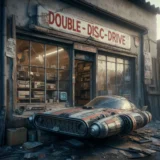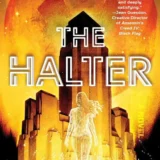
With such an iconic text as 1984 – from the high proportion of students who read it with the academic tinge to the pages to the ever increasingly accurate themes of eroded privacy and censorship rife in society, there is a huge risk in adapting such a powerhouse. However, with such stakes, there is also potentially a huge gain.
In my opinion, Headlong Theatre managed it just right. There is a vividness about it that is hard to pull off with such a well known piece – focusing on the appendix, the development of Newspeak that is to come from 2050 – is echoed in the presence of the reader’s group reading the novel. Their presence is ghosted throughout as we, the audience, can empathise with them. How have things changed? Could this really happen? Or, as is the case nowadays, is it happening now? When did it start and how far can it go?
The theme of ghosting is handled spectacularly in the play. We often see glimpses of the sensual Julia, played by Hara Yannas , who cannot separate love and sex away from being a political statement as well as the looming presence of O’Brien, the interrogator, played by Tim Dutton before they make themselves known to the audience. Winston, played by Mark Arends, is well cast and acted with wiry, nervy and highly strung energy – but at the same time, able to stand up for his rights to privacy and equality to any extreme, or so it seems.
The dramatic presentation of memory and retrospect is really something that must be mentioned in this adaptation of 1984 here. There is a specific scene that deals with this so well, choreographed as a sort of “spot the difference” game. As an aficionado of worldbuilding through gesture and dialogue, I believe the way in which this is conducted is on point.
What the adaptation focuses on so well is the idea that this mega text needs a new angle, a new way to refresh this form, which is so ingrained in our culture (of course, with the shows of Big Brother and Room 101), but with the relative advent of the ubiquitous cyber-life and the murky mire of a continuously evolving space, the erosion of the privacy/public dialectic is more apparent than ever. Privacy at the Donmar is another example of this. This conceit of hindsight, as echoed in the appendix of Newspeak, is a wonderful way of portraying the timeless tale. The mixed media scape is constructed thusly – the room where Julia and Winston hide takes place through recording, as they venture from this format to the live performance. The use of both recording as evidence can place us in similar realms to the thought police, which creates an unsettling feel when watching. It’s seamless – as well as the transitions between the stuffy interior of shelves, folders and stacked files with the starkness of Room 101. The torture scenes are even more visceral when you’re watching them in the flesh and are especially harrowing.
I had the preconceptions of tackling 1984 as a theatre adaptation of maybe being stale, stuffy and unoriginal – but having watched it, I can tell you that this was wrong. The play weaved together the past, present and future so that it lingers in your mind long after watching – the debate is far from over. Please go and see it!
1984 is currently on at the Playhouse Theatre.









